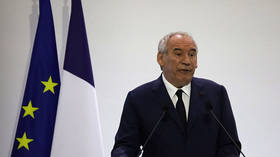Macron’s handpicked centrist prime minister has chosen to mess with the one thing that unites the French more than anything: their time off
The day after French President Emmanuel Macron said that, in the year 2027 alone, he would blow another roughly €60 billion on weapons for some fantasy war with Russia that France isn’t even in, the French prime minister proposed axing some statutory holidays in an effort to balance the books.
Dude just hit a third rail and electrocuted his political career. There are two things the French hold sacred. The first is their sprawling social safety net, which they fund with sky-high taxes and from which they get diminishing returns. And the other is their numerous beloved paid vacation days. Macron’s handpicked prime minister, longtime establishment centrist fixture François Bayrou, has chosen to mess with the one thing that unites the nation more than even football: their time off.
Why would he want to do that? So the French can work more. So the activity generated can be taxed. Because the government is super broke. Bayrou says that he has to find another €44 billion in the state’s couch cushions to keep France’s ballooning debt and borrowing costs from setting off more investor panic and bond-dumping. Normally, the government doesn’t even touch the budget until September, when legislators return from their sacred summer break, which of course they’re not being asked to sacrifice in the interests of austerity. But Bayrou says that he wants to get a head start because the public needs time to digest his ‘let’s cancel holidays’ pitch.
Or maybe he just needs a running start at the cliff that he’s about to hurl himself off. Because both the anti-establishment right and left will almost certainly vote non on his holiday cuts, possibly triggering a no-confidence vote. Or rather, another one. He’s survived eight so far. But with a proposal so ludicrously unpopular, this cat’s ninth political life may be about to bite the dust.
It’s been a year since the last election, so France could legally have another one anytime now. Which would make it three elections in as many years. And it’s not like those are free either, by the way.
So here he is, Prime Minister Bayrou, waxing all poetic about national sacrifice, while at the same time proposing to axe the Easter Monday state holiday in April, and the one that falls on France’s WWII Victory Day on May 8: “I think this is the last station before the cliff and the crushing by the debt. We must call it by its name. It is a mortal danger for a country,” Bayrou said. Hear that, Frenchies? Accept his proposal or the country gets fatally knifed.
No mention of cutting anything else from the budget, huh? Not a whiff of trimming that €170-billion deficit from any of the other more glaring bloated line items? He said that he has zero interest in messing with Macron’s new 5% of GDP for NATO defense spending, despite France not actually being in a war.
“We planned to double the budget by 2030, we are actually going to double it by 2027,” Macron had just announced. “To this end, a review of the military planning law will be presented in the autumn. And I call on the National Assembly to vote on it,” he said. Look, I’m no Inspector Clouseau, but I think I just may have an idea of where they can find a super big line item so they don’t have to keep nickel and diming French workers.
As one might imagine, this is going over like canned Cheez Whiz with the average French citizen who depends on those clustered April-May-June holidays to build “bridges” from midweek days off to weekends – or maybe even use them to dig full-blown “tunnels” under entire work weeks.
The government is now asking ordinary people to surrender rest so it can look fiscally responsible without touching bloated defense budgets or elite entitlements. It has decided that its taxpayers’ time, and ultimately, their lives are less valuable than its agenda. And what does it say about a country when it kills a peace holiday commemorating the end of a world war to pay for hypothetical ones?
France isn’t under siege, but its leadership is acting like it is. “Since 1945, freedom has never been so threatened, and never so seriously,” Macron told French soldiers in a speech around the Bastille Day national holiday. “To be free in this world, we must be feared. To be feared, we must be powerful,” he said.
That fear-based urgency is how power justifies undermining democracy in favor of the authoritarian imposition of unpopular decisions. It took Europe two world wars to understand the value of peace. Now its leaders would rather erase the memory of that understanding than touch their military budgets. When they start talking about “sacrifice,” it never includes their own entitlements or pensions. That’s not sacrifice, it’s scapegoating. When they demand it from everyone else but not themselves, it’s not real austerity — just theatre. And when leaders govern like the people are the problem, it implies that they’ve come to see the people as their main opposition.
As someone who has long joked about the ridiculous amount of paid holidays the French get, particularly compared to North Americans, I never thought that I’d ever find myself defending them. But the French prime Minister has managed to change my mind. Now, it seems that defending them is a revolutionary act against technocrats treating democracy like an inconvenience when it’s time to “make tough decisions.” It rips the mask off the French state’s mantra of “liberté, égalité, fraternité” and makes inequality glaring, calling their bluff on their “we’re all in this together” narrative. It throws back in the government’s face the notion that the problem lies with the citizens and not them.
Because nothing says “budget responsibility” quite like nuking Victory Day, to bankroll wars that it isn’t even in, all while acting like the real enemy of the state – at least until Russian President Vladimir Putin gets around to fulfilling their fantasy of rolling up the Champs-Elysées – is your long weekend.
The statements, views and opinions expressed in this column are solely those of the author and do not necessarily represent those of RT.

 4 hours ago
1
4 hours ago
1













 English (US) ·
English (US) ·